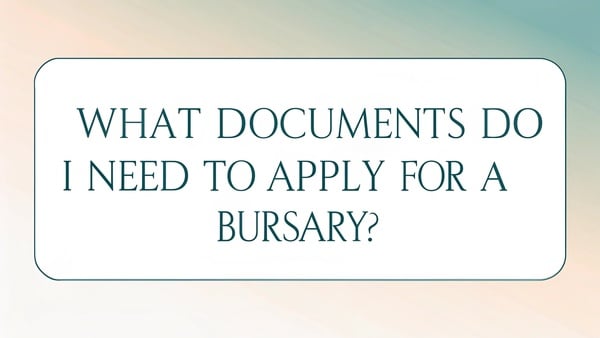
Securing a bursary can transform your educational journey or career advancement by easing financial burdens. To improve your chances of success, it’s essential to submit a well-prepared application with all required documentation. Below is a detailed guide outlining the key documents you’ll need for a bursary application, along with practical advice to ensure your submission stands out.
Why Documents Matter in a Bursary Application
Bursaries are highly competitive, and organizations use your documents to assess eligibility, financial need, and your potential to succeed. Incomplete or incorrect paperwork can lead to rejection, so attention to detail is critical. Proper documentation helps committees verify your background, goals, and alignment with their mission.
Essential Documents for Bursary Applications
While requirements vary by provider, these are the most common documents you’ll need:
1. Proof of Identity
- What You Need: Certified copy of your ID, passport, or birth certificate.
- Why It Matters: Confirms your identity and citizenship/residency, especially for location-specific bursaries.
- Pro Tip: Certification must be recent (within 3–6 months) and from an authorized official (e.g., police officer, notary).
2. Academic Records
- What You Need: Certified transcripts or certificates (e.g., high school results, university grades).
- Why It Matters: Demonstrates academic performance, which is often a key eligibility factor.
- Pro Tip: For pending results, submit a formal letter from your institution confirming enrollment and expected graduation dates.
3. Proof of Financial Need
- What You Need: Recent payslips, bank statements, tax returns, or an affidavit of income.
- Why It Matters: Many bursaries prioritize applicants with limited financial resources.
- Pro Tip: Include household income details if you’re dependent on a parent or guardian.
4. Admission or Enrollment Letter
- What You Need: Official letter from your school/college confirming acceptance or current enrollment.
- Why It Matters: Ensures the bursary is allocated to an active student.
- Pro Tip: If awaiting acceptance, inquire if the bursary accepts provisional applications.
5. Personal Motivation Letter
- What You Need: A 500–1,000-word essay explaining your goals, achievements, and need for the bursary.
- Why It Matters: Highlights your passion and how the bursary aligns with your aspirations.
- Pro Tip: Avoid generic statements—tailor your essay to the bursary’s values (e.g., community service, innovation).
6. Recommendation Letters
- What You Need: 1–2 letters from teachers, employers, or mentors.
- Why It Matters: Provides third-party validation of your character and capabilities.
- Pro Tip: Brief your referees on the bursary’s focus to ensure their letters highlight relevant skills.
7. Updated Resume (CV)
- What You Need: A 1–2 page summary of your education, work experience, and skills.
- Why It Matters: Gives a snapshot of your achievements beyond academics.
- Pro Tip: Emphasize leadership roles or volunteer work if the bursary prioritizes community impact.
8. Proof of Residence
- What You Need: Utility bill, lease agreement, or signed affidavit showing your address.
- Why It Matters: Required for bursaries limited to specific towns, provinces, or regions.
- Pro Tip: Confirm the bursary’s residency rules to ensure you qualify.
9. Additional Supporting Documents
- Examples:
- Medical certificates for disability-related bursaries.
- Portfolios for art, design, or engineering applicants.
- Research proposals for postgraduate funding.
- Why It Matters: Meets niche criteria set by specialized bursaries.
- Pro Tip: Review the application guidelines carefully to identify unique requirements.
How to Organize Your Application
- Follow Instructions: Check the bursary provider’s website for specifics—every program is different.
- Certify Documents Early: Avoid delays by certifying ID copies and academic records ahead of time.
- Use a Checklist: List all required documents and tick them off as you prepare.
- Proofread Thoroughly: Ensure all forms are error-free and signatures are included where needed.
- Submit Early: Allow extra time for postal delays or technical issues with online portals.
Where to Look for Bursary Opportunities
- Educational Institutions: Check your university’s financial aid office or website.
- Government Programs: Explore national schemes like NSFAS (South Africa) or FAFSA (USA).
- Corporate Bursaries: Many companies offer funding in fields like engineering, healthcare, or IT.
- Online Databases: Websites such as Scholarships.com, BursaryPortal, or GradConnection list global opportunities.
Final Tips for Success
Start preparing early to avoid last-minute stress. Keep digital and physical copies of all documents, and follow up with the bursary office if you have questions. A well-organized, honest application shows dedication and increases your chances of being awarded the support you need. Remember: bursaries aren’t just about grades—they’re about potential, perseverance, and purpose.
With the right preparation, you’re one step closer to achieving your educational goals. Best of luck!
Was this helpful?
0 / 0
#Bursaries #Certificate #Documents #Education #Engineering #Police